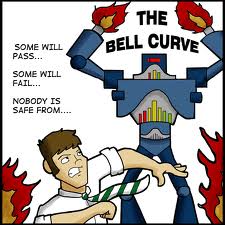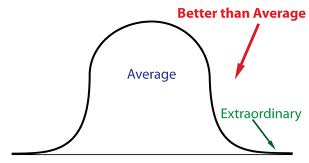

No matter where you look,good is no longer “good enough.” In a recent article in the New York Times, author and trend watcher, Thomas L. Friedman, declared, “Average is Over.” It’s an argument similar to the one made over a decade ago by Robert Reich, former Secretary of Labor under Bill Clinton, in his phenomenally prescient book The Future of Success. I read it at the time with a mixture of apprehension and anticipation. Globalization and advances in information technology were then and are now challenging the status quo. At one time, being average enabled one to live an average life, live in an average neighborhood and, most importantly, earn an average living. Not so anymore.
Average is now plentiful, easily accessible, and cheap. What technology can’t do in either an average or better way, a younger, less-trained but equally effective provider can do for less. A variety of computer programs and web-based systems provide both psychological advice and treatment. (By the way, studies to date document outcomes equal to face-to-face services for at least the most common mental health related issues). At the same time, as reviewed here previously on this blog, the evidence again and again shows no difference in outcome between professionally trained clinicians and students or paraprofessionals. Uh-oh.
What is the solution? Friedman says, “everyone needs to find their extra–their unique value contribution that makes them stand out in whatever is their field.” Yeah, exactly. As my father used to say, “Do your best and then a little better. What can behavioral health professionals do to stand out? Well, if you are trained, licensed or certified, practicing evidence-based, know the latest methods and research findings, and understand how the brain works, then you are, in a word, average. Going forward, standing out will require evidence that you are effective; measures documenting not only who you help but identifying those you do not. Professional development will be less about learning a new method than documenting what you do to “do your best and then a little better.”
Helping clincians stand out is what the ICCE is all about. Everyday, thousands meet online to learn, share, and support each other in both measuring and improving the impact of their clinical work. Each year, the ICCE offers two intensive training opportunities: The Advanced Intensive and the Training of Trainers. Both events are designed to help professionals achieve their personal best. The Training of Trainers is specifically designed for participants, such as supervisors, managers, and agency directors, who wish to train others or transform public or private agencies for achieving success. The Advanced Intensive scheduled for March is sold out. By popular demand, we are offering an unprecedented second opportunity to attend the Advanced Intensive this summer. Don’t wait to register. Despite only announcing this event last week, half of the seats are already booked. Either event will insure that you have the tools and skills necessary to meet the need to exceed. Email us with any questions at: training@centerforclinicalexcellence.com.
(By the way, if you are interested, you catch watch a clip of Friedman delivering his message to the Hudson Society here).

Leave a Reply